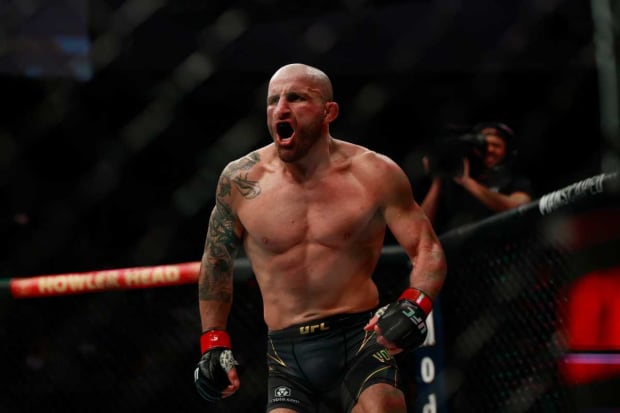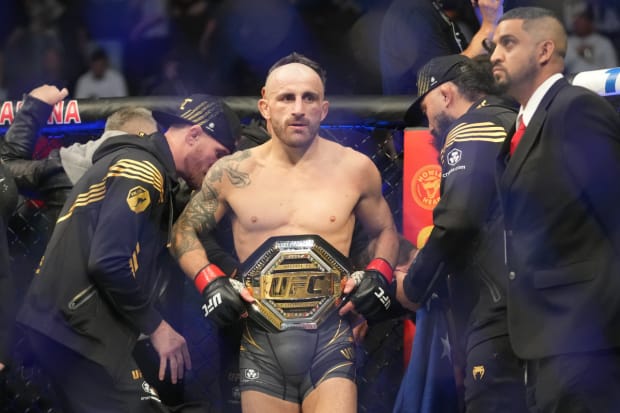View the original article to see embedded media.
There are few hard, fast rules surrounding mixed martial arts. It’s one of the sport’s selling points. Notwithstanding a handful of stipulations—no eye-gouging; no hair-pulling; no kicking a downed opponent; no fish-hooking an open wound—it’s pretty much anything goes. Still, there are a few rules of thumb. Among them: if you’re asking your opponent, midfight, whether they really want to continue, odds are good you’re on your way to victory.
So it went for Alexander Volkanovski last Saturday night in Jacksonville. Headlining UFC 273, the 33-year-old Australian featherweight was administering such a brutal beatdown that he asked his opponent, South Korea’s Jung Chan-sung (a/k/a The Korean Zombie), if he wished to continue on. The Zombie did. But the referee, Herb Dean, thought otherwise, mercifully prying Volkanovski off his prey and waving off the fight early in the fourth round.
With that, Volkanovski didn’t just defend his featherweight belt for a third time. He didn’t just emerge from yet another fight unscathed, extending his win streak to 21 fights encompassing nine years. Volkanovski rattled the UFC’s balance of power. Having cleaned out his division, he is likely to move up to 155 lbs. For a guy who once weighed 214 lbs. as a semi-professional Aussie rugby player, the added heft shouldn’t be an issue.
Two days after his latest win, Volkanovski was up before sunrise to talk with Sports Illustrated. (Lightly edited for clarity and brevity.)
SI: You look pretty good for a guy who just had a fight two days ago.
AV: Not too bad. Didn’t get caught too much. My hands and my feet are pretty sore though.
SI: What about emotionally? How long does it take you to come down from the highs of being in there?
AV: Pretty quick to be honest. I almost forget about it the next day. It’s back to being me straight away. Might sound a little boring but that’s how it is. It’s like, even when I go into the fight I keep myself so composed, level. It works well in ways. Sometimes you don’t appreciate what you’ve done because you’re pretty much over it straight away. Back to normal.

Corey Perrine/Florida Times-Union-USA TODAY NETWORK
SI: That sounds very Aussie.
AV: Yeah that may be. I think you’re on the money. ‘Whatever, mate,” is the attitude. But I’m not the type to gloat about things. It’s like a “tall poppy” thing we have in Australia. I do that to myself sometimes. I’d probably like to change that if I could.
SI: Why?
AV: At the end of the day you should celebrate yourself, you should be pumped. You did what you needed to do. Bringing home that money and that win and bringing that belt home to your family. I guess having a chat with you helps me celebrate.
SI: Here to help. Enough fair dinkum. Go take a victory lap.
AV: Okay then.
SI: We talk a lot about the emotions of being in a close fight and being in a war. What about the opposite? What are the emotions when it’s all one-way traffic, you’re having your way with the guy?
AV: It’s a weird one because I still have a job to do. You talk about the task at hand. Even though things are going good, you still have a guy in front of you trying to take your head off. This helps me not get too excited and let the emotions get over me. That’s when you make mistakes. It has its pros and cons [the calm] but it lets me do what I need to do.
SI: Does empathy ever creep in?
AV: Yeah, sure. Especially in the last one, a lot. To be honest, in the third round, I saw him not get straight away. Didn’t look too good. I thought he looked defeated. I think he felt defeated as well and I could see that. So I started to feel bad. I even said to him in the fourth round, started the fourth round—you can actually watch the tape—I say to him, I go “ Do you really want to keep doing this? Are you sure?”
I don't know if he understood me or not, but you know, I'm sure I would have said the same thing, “Yeah, yeah yeah.” Obviously I went for the finish and it took him out, but you do start to feel. He's a legend. But, yeah, I do definitely feel something in there.
SI: What do you reckon you weigh this morning?
AV: 75 kilograms or something like that. Yeah, 74-75 kilograms.
SI: 165 or so?
AV: Yeah, I’m usually a little bit more heavy 'cause I didn't really eat much after the fight.
SI: I'm sure you've answered this a lot in Australia. But how did you go from—whatever you were playing rugby—
AV: 214 pounds! Yeah, it took time. Just dieting, dieting and you know I slowly made my way down the divisions. So it was middleweight, then to welterweight. It wasn’t something that happened overnight. I talk about that drive that I have in whatever I do. If I’ve got to make welterweight, I’m going to make welterweight. If I’ve got to make middleweight, I’ll make middleweight. So just discipline and diet and all that got me down.

David Yeazell-USA TODAY Sports
SI: What's the biggest thing you had to give up?
AV: So much bread. I used to love bread with all my dinners. I’d have a big dinner and I would have made four to six pieces of bread with it. I used to love those days. But I’m glad I’m not eating all that.
SI: What's your relationship with rugby now? Do you still follow?
AV: Rugby league. Yeah, yeah, I still watch. Actually I do some of the wrestling for the Illawarra Dragons, local team. So since I’ve done that, I’ve really connected within that world again.
SI: You miss it?
AV: Ah, not really, 'cause I was doing the wrestling with some of these guys and they’re absolute monsters, putting massive shots on each other. Like oh, I'm glad I'm not doing this anymore. But I'm sure when they watch us fighting and punching each other in the face, they say the same thing as well.
SI: I'm curious about the team versus the individual. Do you miss the camaraderie? Do you miss the trips? Do you like being your own boss?
AV: Well, man, I got a bit of both, right? So I still got a team. But at the same time, one thing I love about, you know, MMA—It's like everything's on me, you know? My team can't let me down. It's all on me. If I put the work in, I’m going to get the job done. I've always been that way. There were games when I can have the best game of my life and we still lose. You know, ‘cause the team didn’t do their part. No, I mean in vice versa—I could let them down.
But I’m not usually the type to half-ass anything. I go all out. I don't usually let myself down because I know I always prepare and put the work in. That’s the type of guy I am. And that’s what’s got me to where I am. I’m disciplined and I got that work ethic.
SI: What's the source of that?
AV: Maybe just, well, how I grew up. Maybe my upbringing.
SI: How’d you grow up?
AV: I mean, the European background. My folks are hard workers. Watching them as you grow up you learn from what you see, right? I wouldn’t say I was on my own, but I think there's a lot of times when you cook yourself dinners, you have to get yourself to school and all that stuff at a pretty young age [because] they were at work and trying to make money to put food on the table. So I had to raise myself pretty young and I don't mean that in a bad way.
They were great to us. Great parents, but no one worked harder, so they couldn't be there all the time. So I feel like that independence played big factor. And that warrior blood we talk about—Macedonian and Greek.
You know, that's why I feel like I'm a good cook. Because I cook my own dinners at a very young age. I used to make my own breakfast and lunches for school and all that type of stuff.
SI: What's your go-to dish?
AV: I’d have to say Pho. Beef Pho. I love my Vietnamese soup. I love it. Me and my coach traveled the world, we didn’t feel sorry eating Pho.
SI: I didn't see that coming. What did your folks do?
AV: My dad was a concreter. And we started restaurants as well. Like a chips store or like a pizza store and all that, so I used to be a concreter as well.
SI: And you worked with him a little bit?
AV: Yeah, I was concreting. Even when I was early in MMA, I was concreting. I would train like in the [rugby] league that week and I would train MMA. All at once. That sort of shows you that work ethic.
SI: We’re coming up on the nine-year anniversary—it’s been a long time—since you've lost a fight. What are your recollections from that? I mean, what do you take away from that as long ago as it was?
AV: It was a long time ago. You know, I was talking about it the other day. The trouble with MMA is I got my start late, I started at 22 years old so I felt like I had a lot of catching up to do. I wanted to take out all the top guys so I could take their spot. Move me up as quick as I could, so I was like that from the start, so all my fights were tough. I took whatever fight, whoever, uh, anybody. And then even some of the good guys. I'm like, I know he's a man but I’m the man.
I mean it went OK, but obviously I got the loss. And I learned from that and It made me realize, alright this division maybe isn’t right for me anyways because they're twice the size of me. So that's when I started to come down. But you learn a lot from your losses. But, you learn a lot from your wins as well. A lot of people think - You only need your losses to learn, but that's not true. You know so much from a win. You are still getting hit. You're still making mistakes. There wasn't too much that went wrong a couple of nights ago. But there's still going to be things I can take from there. There's still going to be times I probably could have capitalized on something else. It doesn't have to be a loss for you learn.
SI: You’re sick of being asked what's next?
AV: No, no, I expect that. I don't mind hearing feedback as well, like what a lot of people think is next. But right now I'm in a position where we have some options. We'll see with the UFC show us; we'll see what our division is doing. I do want to get back in there, so I need to start figuring that out pretty soon, but lightweight division, it's definitely something I got my eye on. … Yeah, I think I'm in a position where I deserve to at least call that.
More MMA Coverage:
• Vadim Nemkov on Representing Russia at Bellator 277: Keep Sports Out of Politics







